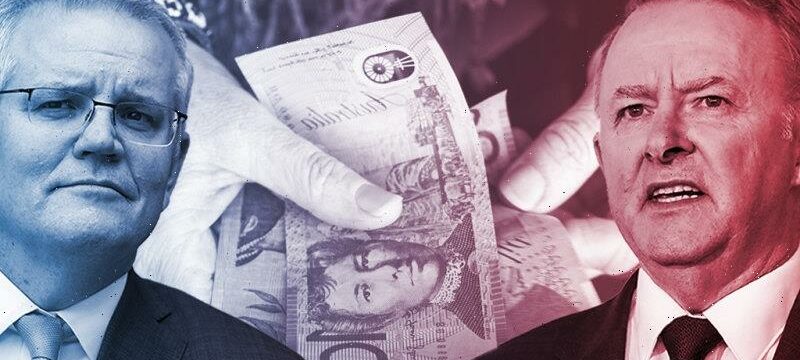Australians have backed an increase in the minimum wage after an election row over the impact of inflation on household earnings, with 67 per cent of voters supporting a higher base pay despite government warnings about a chain reaction that could hurt the economy.
In a dispute that is shaping the final stage of the election campaign, a majority of uncommitted voters favour an increase in the $20.33 hourly rate after Labor leader Anthony Albanese said he “absolutely” believed the rate should rise by 5.1 per cent to keep up with inflation.
Australians have backed an increase in the minimum wage after an election row over the impact of inflation on household earnings.Credit:
Prime Minister Scott Morrison called Albanese a “loose unit on the economy” for making that remark but only 16 per cent of voters believe the minimum wage should stay at its current rate.
An exclusive survey shows that 40 per cent of respondents support a 5.1 per cent boost while another 27 per cent support an increase by a smaller amount.
With both leaders racing to secure wavering voters before the polls close on Saturday, the survey reveals 34 per cent of uncommitted voters favour the 5.1 per cent increase and 23 per cent support a smaller increase.
The exclusive survey, conducted for The Sydney Morning Herald and The Age by research company Resolve Strategic, highlights the risk for Morrison when the Coalition has a narrow lead over Labor on managing the economy but has fallen behind when voters are asked who is best to manage jobs and wages.
On Wednesday, data showed the wage price index increased by a lower-than-expected 0.7 per cent in the March quarter, taking annual wages growth to 2.4 per cent. Over the same period, however, annual inflation was running at 5.1 per cent. The 2.7 percentage gap between inflation and wages is the largest on record.
The prime minister emphasised on Wednesday that wages were rising but said “the challenge is inflation” and that this was a global problem.
“The way wages go up is when you get unemployment down and get businesses that are able to earn more so they can afford and pay higher wages,” he said while campaigning in the marginal Victorian seat of Corangamite.
“I want to see wages go up. I want to see the minimum wage go up. Of course I do.”
Morrison attacked Albanese last week, however, for supporting a 5.1 per cent increase in the minimum wage and said it was a “thoughtless” contribution because it would fuel inflation and feed through to higher costs at the supermarket and have an impact on jobs.
“What he said yesterday puts a chain reaction in place. Dominoes fall that lead to higher interest rates and higher costs of living,” Morrison said on Wednesday of last week.
While the prime minister has softened his language on the wage hike in recent days, Albanese repeated his argument in a speech to the National Press Club on Wednesday by saying again he “absolutely” backed the higher rate.
The Resolve Political Monitor surveyed 1649 people on questions of policy from Thursday to Tuesday to produce findings with a margin of error of 2.5 per cent.
Morrison and the Coalition held a clear lead over Albanese and Labor when voters were asked who they thought was best to manage the economy, with 40 per cent naming the government and 30 per cent naming the opposition.
But the gap between the two sides on this measure has narrowed to 10 percentage points from 19 in the middle of April and 15 at the end of April.
Asked which leader and party was best to manage jobs and wages, 32 per cent named Morrison and the Coalition while 38 per cent said Albanese and Labor.
The latest Resolve Political Monitor, which showed a swing against Labor, also asked voters to name the most important issues for them at the election.
The biggest issue was keeping the cost of living low, an option chosen by 25 per cent of voters, followed by the environment and climate change, chosen by 14 per cent, and economic management and recovery, chosen by 13 per cent.
The issue of jobs and wages was chosen by 10 per cent of respondents in the latest survey, up from 5 per cent who chose it in the Resolve Political Monitor in the middle of April.
Cut through the noise of the federal election campaign with news, views and expert analysis from Jacqueline Maley. Sign up to our Australia Votes 2022 newsletter here.
Most Viewed in Politics
From our partners
Source: Read Full Article

